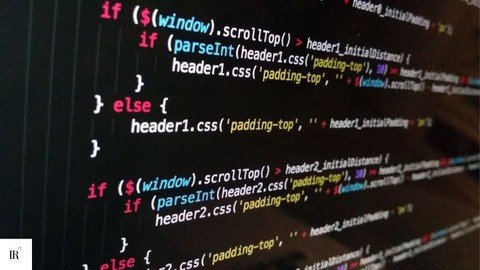
Published 4/2023
MP4 | Video: h264, 1280x720 | Audio: AAC, 44.1 KHz
Language: English | Size: 371.96 MB | Duration: 1h 15m
Software Practices, Programming Style, Productivity, Clean code, software engineering
Free Download What you'll learn
Importance of programming style in stable software
Techniques to achieve a productive programming style across team
Considerations to ensure style doesn't become a point of debate among teams and a time sink.
Examples that can be easily mapped to daily production code
Requirements
Basic knowledge of any programming language
Description
This course teaches you the importance of programming practices and style, and how to write clear, maintainable code. You will learn various techniques for naming variables and functions, indentation, formatting, and avoiding common pitfalls in code readability. By the end of the course, you will have a solid understanding of how to write code that is easy to read, understand, and maintain, making you a more effective programmer.Note: The content of this course is also published as part of an in-depth course titled "Programming Practices Bootcamp for production ready coding."Course Outline:Introduction to Programming Practices and StyleThe importance of nurturing good style in programmingWriting code for humans and letting common sense prevailNaming ConventionsDesired characteristics of variable and function namesType in variable names and use verbs for function namesRemoving ambiguity and maintaining consistencyIndentation and FormattingUtilizing IDEs and configuration files for formattingAligning code for readability and understandingIndentation, expression, and statement writing tipsComments and DocumentationWriting comments for humans and their importanceBalancing valuable comments with code readabilityProper use of comments and avoiding bad practicesCode Readability and ComplexityWriting code in a natural, understandable formAvoiding complex expressions and unnecessary clevernessCaution against side effects and prioritizing ease of understandingControl Structures and Language FeaturesProper use of if-else, switch-case, and other control structuresMacro myths and avoiding multiple evaluationsMagic numbers, constants, and other code readability concernsConsistency and AdaptabilityConsistency over style: when to adapt existing code styleUnderstanding that programming languages are like natural languagesPreserving style within existing codebasesBy the end of this course, you will have developed the skills to write clean, maintainable, and easy-to-understand code, making you a more effective programmer. Enroll now and improve your programming practices and style for a successful career in software development.
Overview
Section 1: Introduction
Lecture 1 Introduction
Section 2: Why does programming style matter?
Lecture 2 Necessity for nurturing good practices
Lecture 3 You write higher level languages for humans
Lecture 4 Let common sense prevail
Section 3: Naming Desired Characteristics
Lecture 5 Introduction
Lecture 6 Be concise
Lecture 7 Informative
Lecture 8 Memorable
Lecture 9 Pronouncable
Lecture 10 Naming and scope
Section 4: Variable Names
Lecture 11 Choosing variable names
Lecture 12 Always avoid using the word "always"
Lecture 13 Rules are local
Lecture 14 Use of type in variable names
Lecture 15 Using as functionality indicator
Lecture 16 Preference of spelling
Lecture 17 Quick Assignment
Lecture 18 Issues in code
Lecture 19 Solution and the fixed code
Section 5: Function naming
Lecture 20 Overview
Lecture 21 Use verbs
Lecture 22 Remove ambiguity
Lecture 23 Example walkthrough
Lecture 24 Solution
Section 6: Indentation
Lecture 25 Introduction
Lecture 26 Use IDE optimally
Lecture 27 Format configuration files
Lecture 28 Formatting as a build step
Lecture 29 Formatting earlier than build
Section 7: Expressions and statments
Lecture 30 Write as you want to read
Lecture 31 Use natural expression
Lecture 32 Parenthesize
Lecture 33 Code Example
Section 8: Complexity in expressions and statements
Lecture 34 Avoid complexity
Lecture 35 Languages trust programmers
Lecture 36 Cost of cleverness
Lecture 37 Abuse of bitwise operators
Lecture 38 Abuse of ternary operators
Lecture 39 Ease of understanding the code is paramount
Lecture 40 Caution against side effects
Section 9: Consistency and Idioms
Lecture 41 Consistency over style
Lecture 42 Arguments are waste of time
Lecture 43 Preserve style
Lecture 44 Natural language perspective
Lecture 45 Conventional approach
Lecture 46 A case for else-if
Lecture 47 Switch case and reality
Section 10: Still using Macros?
Lecture 48 Macro Myths
Lecture 49 Multiple evaluations?
Lecture 50 Parenthesize!
Section 11: Magic numbers
Lecture 51 Introduction
Lecture 52 Constants and magic numbers
Lecture 53 Using character constants
Lecture 54 Computing Array size in C
Section 12: Comments
Lecture 55 Comments are for humans
Lecture 56 Global variables and comments
Lecture 57 Comments and bad code
Lecture 58 Add values not confusion
Section 13: Conclusion
Lecture 59 Closing remarks
Lecture 60onus lecture
Beginner developers in any programming language,Computer science students,Software professionals in early stages of their careers,Anyone who has recently learned a programming language and wishes to pursue a career as software developer
Homepage
https://www.udemy.com/course/programming-practices-style/
Buy Premium From My Links To Get Resumable Support,Max Speed & Support Me
Links are Interchangeable - Single Extraction
Comments

